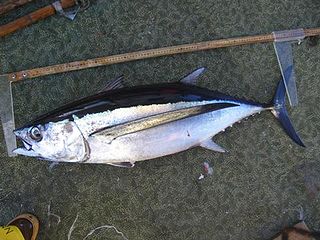
The albacore, known also as the longfin tuna, is a species of tuna of the order Scombriformes. It is found in temperate and tropical waters across the globe in the epipelagic and mesopelagic zones. There are six distinct stocks known globally in the Atlantic, Pacific, and Indian oceans, as well as the Mediterranean Sea. The albacore has an elongate, fusiform body with a conical snout, large eyes, and remarkably long pectoral fins. Its body is a deep blue dorsally and shades of silvery white ventrally. Individuals can reach up to 1.4 m in length.
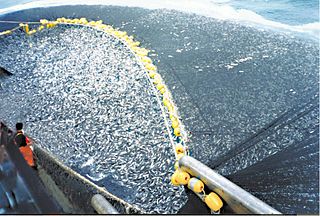
Overfishing is the removal of a species of fish from a body of water at a rate greater than that the species can replenish its population naturally, resulting in the species becoming increasingly underpopulated in that area. Overfishing can occur in water bodies of any sizes, such as ponds, wetlands, rivers, lakes or oceans, and can result in resource depletion, reduced biological growth rates and low biomass levels. Sustained overfishing can lead to critical depensation, where the fish population is no longer able to sustain itself. Some forms of overfishing, such as the overfishing of sharks, has led to the upset of entire marine ecosystems. Types of overfishing include growth overfishing, recruitment overfishing, and ecosystem overfishing. Overfishing not only causes negative impacts on biodiversity and ecosystem functioning, but also reduces fish production, which subsequently leads to negative social and economic consequences.

A conventional idea of a sustainable fishery is that it is one that is harvested at a sustainable rate, where the fish population does not decline over time because of fishing practices. Sustainability in fisheries combines theoretical disciplines, such as the population dynamics of fisheries, with practical strategies, such as avoiding overfishing through techniques such as individual fishing quotas, curtailing destructive and illegal fishing practices by lobbying for appropriate law and policy, setting up protected areas, restoring collapsed fisheries, incorporating all externalities involved in harvesting marine ecosystems into fishery economics, educating stakeholders and the wider public, and developing independent certification programs.
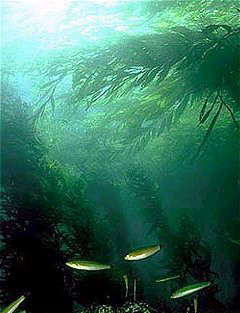
Kelp forests are underwater areas with a high density of kelp, which covers a large part of the world's coastlines. Smaller areas of anchored kelp are called kelp beds. They are recognized as one of the most productive and dynamic ecosystems on Earth. Although algal kelp forest combined with coral reefs only cover 0.1% of Earth's total surface, they account for 0.9% of global primary productivity. Kelp forests occur worldwide throughout temperate and polar coastal oceans. In 2007, kelp forests were also discovered in tropical waters near Ecuador.
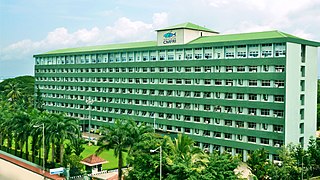
The Central Marine Fisheries Research Institute was established in the government of India on 3 February 1947 under the Ministry of Agriculture and Farmers Welfare and later, in 1967, it joined the Indian Council of Agricultural Research (ICAR) family and emerged as a leading tropical marine fisheries research institute in the world. The Headquarters of the ICAR-CMFRI is located in Kochi, Kerala. Initially the institute focused its research efforts on creating a strong database on marine fisheries sector by developing scientific methodologies for estimating the marine fish landings and effort inputs, taxonomy of marine organisms and the biological aspects of the exploited stocks of finfish and shellfish on which fisheries management were to be based. This focus contributed significantly to development of the marine fisheries sector from a predominantly artisanal, sustenance fishery till the early sixties to that of a complex, multi-gear, multi-species fisheries.

Marine ecosystems are the largest of Earth's aquatic ecosystems and exist in waters that have a high salt content. These systems contrast with freshwater ecosystems, which have a lower salt content. Marine waters cover more than 70% of the surface of the Earth and account for more than 97% of Earth's water supply and 90% of habitable space on Earth. Seawater has an average salinity of 35 parts per thousand of water. Actual salinity varies among different marine ecosystems. Marine ecosystems can be divided into many zones depending upon water depth and shoreline features. The oceanic zone is the vast open part of the ocean where animals such as whales, sharks, and tuna live. The benthic zone consists of substrates below water where many invertebrates live. The intertidal zone is the area between high and low tides. Other near-shore (neritic) zones can include mudflats, seagrass meadows, mangroves, rocky intertidal systems, salt marshes, coral reefs, lagoons. In the deep water, hydrothermal vents may occur where chemosynthetic sulfur bacteria form the base of the food web.

The short-tail stingray or smooth stingray is a common species of stingray in the family Dasyatidae. It occurs off southern Africa, typically offshore at a depth of 180–480 m (590–1,570 ft), and off southern Australia and New Zealand, from the intertidal zone to a depth of 156 m (512 ft). It is mostly bottom-dwelling in nature and can be found across a range of habitats from estuaries to reefs, but also frequently will swim into open water. One of the largest stingrays in the world, this heavy-bodied species can grow upwards of 2.1 m (6.9 ft) across and 350 kg (770 lb) in weight. Its plain-colored, diamond-shaped pectoral fin disc is characterized by a lack of dermal denticles even in adults, and white pores beside the head on either side. The body can have colors as well as dark grey or black with rows of white spots along each wing. Its tail is usually shorter than the disc and thick at the base. It is armed with large tubercles and a midline row of large thorns in front of the stinging spine which has the dorsal and ventral fin folds behind.
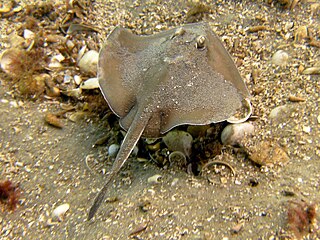
The sparsely spotted stingaree, also known as the white-spotted stingaree or Dixon's stingaree, is a species of stingray in the family Urolophidae, common off the southern Australian coast. Preferring sandy flats and seagrass beds, this benthic ray can be found from close to shore to a depth of at least 150 m (490 ft), and tends to occur deeper in the northern portion of its range. Reaching a length of 57 cm (22 in), this species has a broad, diamond-shaped pectoral fin disc that is typically plain gray in color above with a V-shaped marking between the eyes. Individuals from southerly waters also generally exhibit a smattering of small, dark-edged white spots. This ray is further characterized by a distinctively bell-shaped curtain of skin between the nostrils. Its tail has a skin fold running along either side and a leaf-shaped caudal fin, but no dorsal fin.
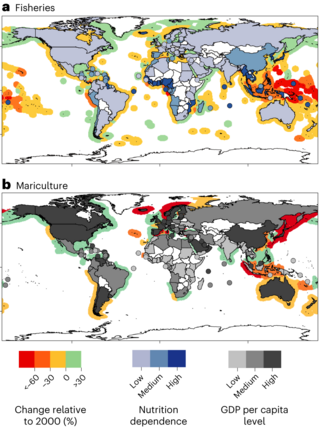
Fisheries are affected by climate change in many ways: marine aquatic ecosystems are being affected by rising ocean temperatures, ocean acidification and ocean deoxygenation, while freshwater ecosystems are being impacted by changes in water temperature, water flow, and fish habitat loss. These effects vary in the context of each fishery. Climate change is modifying fish distributions and the productivity of marine and freshwater species. Climate change is expected to lead to significant changes in the availability and trade of fish products. The geopolitical and economic consequences will be significant, especially for the countries most dependent on the sector. The biggest decreases in maximum catch potential can be expected in the tropics, mostly in the South Pacific regions.

The Institute for Marine and Antarctic Studies (IMAS) is a teaching and research institute of the University of Tasmania in Hobart, Tasmania. IMAS was established in 2010, building upon the university's partnership with CSIRO Oceans and Atmosphere and the Australian Antarctic Division in cooperative Antarctic research and Southern Ocean research.

Sepioteuthis lessoniana, commonly known as the bigfin reef squid, tiger squid, glitter squid, oval squid, or northern calamari, is a species of loliginid squid. It is one of the three currently recognized species belonging to the genus Sepioteuthis. Studies in 1993, however, have indicated that bigfin reef squids may comprise a cryptic species complex. The species is likely to include several very similar and closely related species.

There are many effects of climate change on oceans. One of the most important is an increase in ocean temperatures. More frequent marine heatwaves are linked to this. The rising temperature contributes to a rise in sea levels due to the expansion of water as it warms and the melting of ice sheets on land. Other effects on oceans include sea ice decline, reducing pH values and oxygen levels, as well as increased ocean stratification. All this can lead to changes of ocean currents, for example a weakening of the Atlantic meridional overturning circulation (AMOC). The main cause of these changes are the emissions of greenhouse gases from human activities, mainly burning of fossil fuels and deforestation. Carbon dioxide and methane are examples of greenhouse gases. The additional greenhouse effect leads to ocean warming because the ocean takes up most of the additional heat in the climate system. The ocean also absorbs some of the extra carbon dioxide that is in the atmosphere. This causes the pH value of the seawater to drop. Scientists estimate that the ocean absorbs about 25% of all human-caused CO2 emissions.

The Great Southern Reef is a system of interconnected reefs that spans the southern coast of continental Australia and Tasmania and extends as far north as Brisbane to the east and Kalbarri to the west. It covers 71,000 km2 (27,000 sq mi) of ocean and straddles five states, running along the coast for 8,000 km (5,000 mi).

The Australian Society for Fish Biology (ASFB) is a professional organisation of fish and fisheries researchers. Founded in 1971, the society describes itself as a "professional, independent, non-profit, non-commercial and non-aligned organisation." The Australian Society for Fish Biology holds annual conferences for its members, sometimes in partnership with related organisations such as the Oceania Chondrichthyan Society and the Australian Society for Limnology. Former presidents of the society include Hamar Midgley (1977–79), Gerry Allen (1979–81), Julian Pepperell (1991–93) and Bronwyn Gillanders (2012–13).
Professor Nicole Webster is an Australian marine scientist who is the Executive Director for the Institute of Marine and Antarctic Studies at the University of Tasmania.
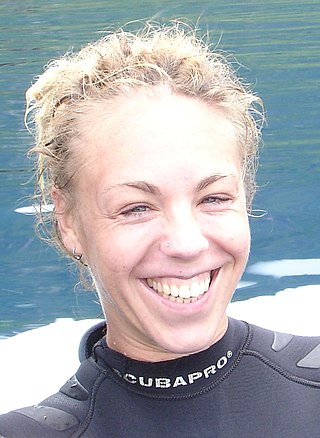
Jessica Melbourne-Thomas is a marine, Antarctic, and climate change scientist with the Commonwealth Scientific and Industrial Research Organisation, Australia. Her research focuses on climate change, its effects on the marine environment, and how to adapt and response to these changes.
The K. Radway Allen Award is the highest honour awarded by the Australian Society for Fish Biology. It recognises individuals who have made an "outstanding contribution in fish or fisheries science." The award, inaugurated in 1995, is named for New Zealand fisheries biologist Kenneth Radway Allen.

A marine heatwave is a period of abnormally high sea surface temperatures compared to the typical temperatures in the past for a particular season and region. Marine heatwaves are caused by a variety of drivers. These include shorter term weather events such as fronts, intraseasonal events, annual, and decadal (10-year) modes like El Niño events, and human-caused climate change. Marine heatwaves affect ecosystems in the oceans. For example, marine heatwaves can lead to severe biodiversity changes such as coral bleaching, sea star wasting disease, harmful algal blooms, and mass mortality of benthic communities. Unlike heatwaves on land, marine heatwaves can extend over vast areas, persist for weeks to months or even years, and occur at subsurface levels.
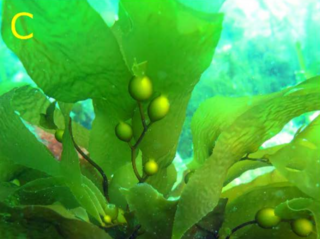
Giant kelp marine forests of south east Australia is an endangered ecological community, listed under the EPBC Act of the Commonwealth of Australia. The community is found in coastal waters of Victoria, South Australia, and Tasmania.
Elizabeth A. Fulton, also known as Beth Fulton, is an Australian ecosystem modeller, who was elected a Fellow of the Australian Academy of Science in 2022. She is a Research Group Leader at CSIRO Oceans & Atmosphere in Hobart, Tasmania.


















